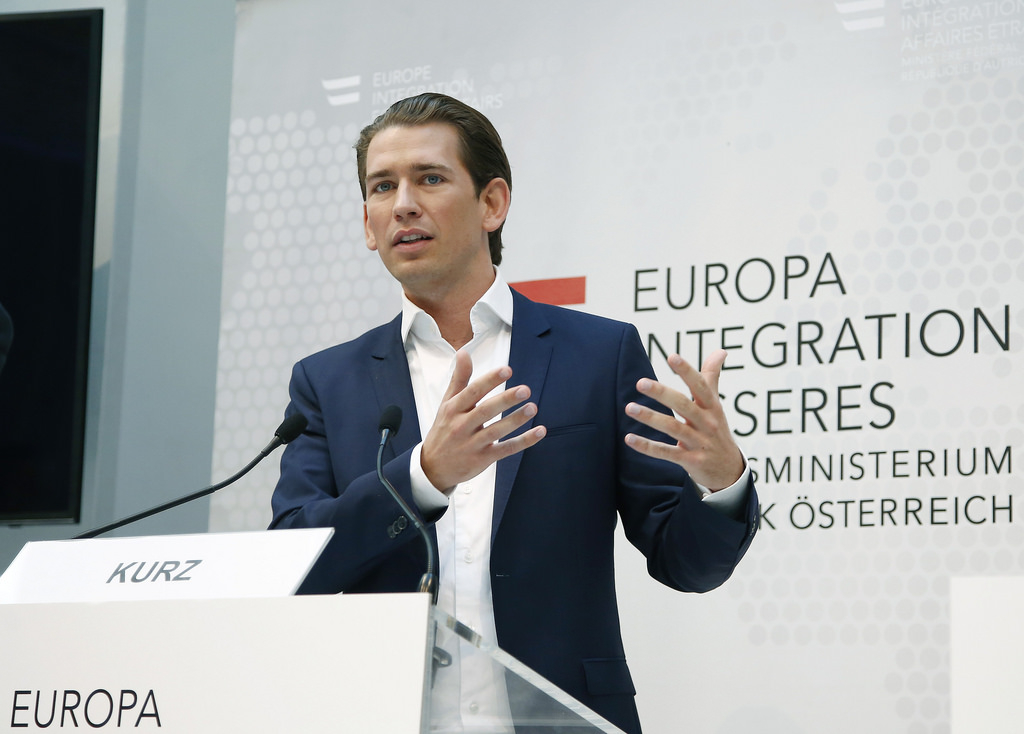A groundbreaking new law regulating the integration of immigrants has gone into effect in Austria. The so-called Integration Law — which bans full-face Muslim veils in public spaces and prohibits Islamic radicals from distributing the Koran — establishes clear rules and responsibilities for recognized asylum seekers and refugees who are granted legal residence in the country.
Austrian officials say the main goal of the law is to promote respect for Austrian values, customs and culture; Muslims claim that the measure unfairly targets them and will promote "Islamophobia."
As of October 1, anyone covering his or her face in public with a burka, niqab or mask is subject to a fine of €150 ($175). The law, which follows similar bans in Belgium, France and the Netherlands, requires the face to be completely visible in all public spaces, including bus, rail, air and sea transport. Those who refuse to comply are subject to arrest.
The new law also requires immigrants from non-EU countries to sign an "integration contract" which obligates them to learn written and spoken German and to enroll in courses about the "basic values of Austria's legal and social order." Immigrants are also required to "acquire knowledge of the democratic order and the basic principles derived from it."
Immigrants are subsequently required to take an "immigration exam" to prove that they have "in-depth knowledge of the German language for independent use" and "in-depth knowledge of the fundamental values of the legal and social order of the Republic of Austria."
Immigrants have a period of two years to prove their compliance with the integration agreement. Those who fail to comply are subject to fines of up to €500 ($585), imprisonment of two weeks and the loss of social welfare benefits — but not deportation.
The new integration law is the brainchild of Foreign Minister Sebastian Kurz, the leader of the conservative Austrian People's Party (ÖVP). Kurz, who has taken an increasingly hard line on immigration, is leading the opinion polls in the run-up to parliamentary elections on October 15 and is on track to becoming Austria's next chancellor. He explained the rationale behind the new law:
"The new integration law regulates the central framework conditions for the integration of people who want to settle in Austria: We need clear rules and regulations in order to achieve social solidarity and social peace. The principle on which this law is based is 'integration through performance.' People are not judged by their country of origin but by their will to contribute to Austria. The main goal of this law is to promote integration."
 Austria's new integration law is the brainchild of Foreign Minister Sebastian Kurz, the leader of the conservative Austrian People's Party. In explaining the rationale behind the new law, Kurz said: "The immigration seen in recent years is changing our country not in a positive but in a negative way... Uncontrolled immigration destroys the order in a country." (Image source: Austrian Foreign Ministry) |
The Algerian-French businessman Rachid Nekkaz said that he was committed to "neutralizing" the impact of Austria's burqa ban by paying all fines issued to Muslim women for violating the new law. "If one accepts religious freedom, one must also accept the visibility of religions," he said. Nekkaz has reportedly paid more than €200,000 worth of fines issued to burqa-wearers in Belgium and France.
"We will not tolerate any symbols that aim to build a counter-society with us," replied Kurz.
Previously, Kurz was instrumental in reforming Austria's century-old Islam Law (Islamgesetz), governing the status of Muslims in the country. Kurz's other new law, which was passed in February 2015, is aimed at integrating Muslims and fighting Islamic radicalism by promoting an "Islam with an Austrian character." It also stresses that Austrian law must take precedence over Islamic Sharia law for Muslims living in the country.
Austria's Muslim population now exceeds 700,000 (or roughly 8% of the total population), up from an estimated 340,000 (or 4.25%) in 2001 and 150,000 (or 2%) in 1990, according to data compiled by the University of Vienna.
The massive demographic and religious shift underway in Austria, traditionally a Roman Catholic country, appears irreversible. In Vienna, where the Muslim population now exceeds 12.5%, Muslim students already outnumber Catholic students at middle and secondary schools. Muslim students are also on the verge of overtaking Catholics in Viennese elementary schools.
At the same time, Austria has emerged as a major base for radical Islam. Austria's Agency for State Protection and Counterterrorism (BVT) has warned of the "exploding radicalization of the Salafist scene in Austria." Salafism is an anti-Western ideology that seeks to impose Islamic Sharia law.
"The immigration seen in recent years is changing our country not in a positive but in a negative way," said Kurz, who is campaigning on a "law and order" platform: "Uncontrolled immigration destroys the order in a country."
Soeren Kern is a Senior Fellow at the New York-based Gatestone Institute.


